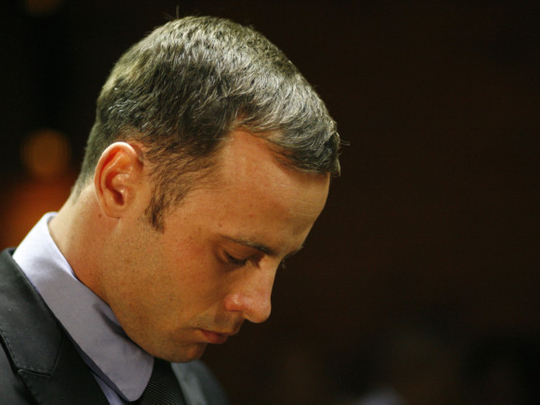
The trial of Oscar Pistorius, who denies the murder of his girlfriend, Reeva Steenkamp, is according to the Independent “the most eagerly awaited trial in South African legal history”. That can’t be right, can it? This is a nation that saw Nelson Mandela prepared to die for “the ideal of a democratic and free society” in the Rivonia trial. This is a country in which the rule of law and the demands of power stood for years in brutal contradiction. Can this killing, intentional or not, ever hold so much meaning?
On the one hand, no — it’s the hyperbole required by the intensity of the glare, the same impulse that drives reporters across the world to describe the moment when Pistorius holds his head in his hands, that propels the BBC to tell us what colour highlighter the man is using. In the circular logic of the media circus, the fact of its global reach means it must have global importance. Anyone questioning that would have to exercise some restraint.
Celebrity trials bring a looting mentality. There’s a breakdown of norms, a sense that decency is pointless if you don’t report it, someone else will. It’s understandable the private life of the accused, usually so prized, so closely defended behind its PR ramparts, is cast into open court for anyone to see. Who wouldn’t grab all they could? But that doesn’t give it significance; we’ll wake up from this as we would from any other riot, with a hangover and some canned goods that we can’t remember wanting.
And yet, of course, there is meaning in this trial: misogyny is on trial; violence against women is on trial; guns are on trial. Drawing a comparison with the killing of Trayvon Martin, the Nation journalist Dave Zirin makes a subtle, thought-provoking point about gated communities themselves, the way they have “become throbbing pods of paranoia and parabellums”; in which reading, even if this is judged accidental, inequality itself is on trial.
South African justice has a case to answer here, with its 14 per cent conviction rate for rapists; but it’s not as though the UK or America have anything to crow about in that regard. The wider culture of South Africa is on trial as a nidus of violence against women, a country with the highest recorded incidence of rape in the world, in which three women a day are killed by their partners.
But the more we turn these figures over, the more global they are, restricted neither to rich countries nor poor ones. Often the only discernible difference between one country and another is not in women’s experiences but in the reliability of the statistical collection that illustrates them.
Unavoidably, if we see this case as synecdoche for the way justice fails women in that country, we have to ask how well are women served by justice here? If we watch this trial making any connection between Steenkamp’s death and the demonstration that occurred two days before it outside South Africa’s parliament, protesting at the pathetic punishments of men who kill women, we have to make that connection between the death of women everywhere and the global indolence that meets the prosecution of their killers.
Here the case does have significance to warrant its exposure; it opens up a chasm between those who look at this case and see a misogyny that is global and systemic, and those who not only reject that but openly laugh at it, trivialising a woman’s death just to attack the audacity of those who insist upon its seriousness.
The most obvious example, of course, is Paddy Power, the bookies who were offering a bet on his innocence with the promise of your money back if Pistorius “walked”. A suggestion hovers over the wording, that it sets out to mock the defendant’s prosthetic legs; but of course there is no mistaking the main intent, which is to treat this death as a piece of fun. Would they do it if a child had died? What if a man had?
There is something disgusting in how easily those questions are answered. The journalist Giles Coren tweeted something in the same mould: “The lawyers and witnesses in the Pistorius case are SO good at funny accents but is it respectful?” The “joke” (“I think foreigners are funny”) is supposed to scene-set this as an anti-PC jape. Come on, be reasonable — if foreigners can accept that they’re inherently funny, why can’t women too? Why are the one billion always rising? Why can’t they just pipe down?
Those provocations, deliberately conceived as antics, don’t depress me as much as the casual objectification in the tabloids: Steenkamp a collection of body parts (mainly “leggy”); Pistorius the embodiment of heroism (indeed, in a bizarre description of his bearing by the Washington Post at his bail hearing, “inspirational”). Taken together, this goes a long way towards explaining how such cases become so totemic; the status quo isn’t a compromise between those who see misogyny everywhere and those who refuse to see it. It’s a ceasefire born of depletion; we’re all just waiting for fresh ammo.
Yet, just because the Pistorius trial started, or restarted, this battle, doesn’t mean it can finish it. When OJ Simpson was on trial, different divisions opened up: it became a conduit for a conversation about race — could a black man ever be found not guilty? — and simultaneously one about wealth and access to justice — could a rich man ever be convicted? Even if those questions weren’t a zero-sum game, the trial — one life, one death — could never have been big enough to answer them. These crucible trials end but never resolve.
— Guardian News & Media Ltd









